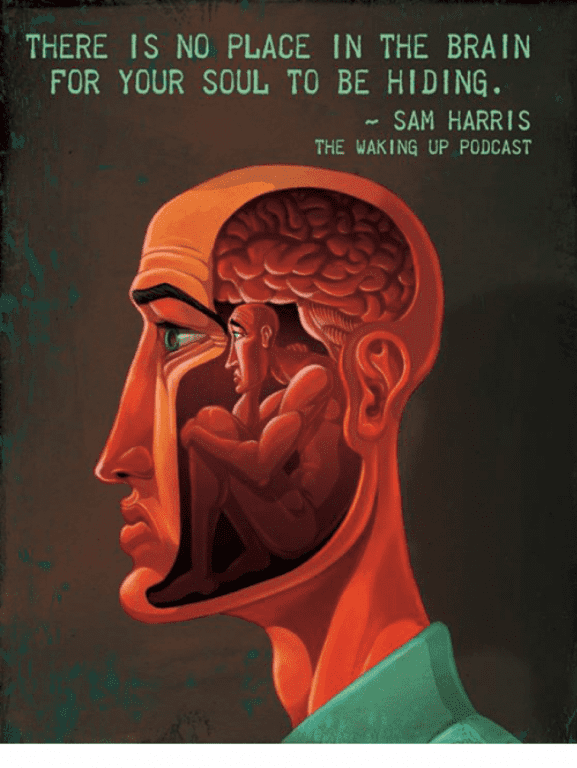“There is no place in the brain for a soul to be hiding.”
I recently heard this phrase on a podcast by Sam Harris, who is an American cognitive neuroscientist and philosopher. Harris, one of the Four Horsemen of Atheism, believes that the self is an illusion that will disappear upon close examination. For Harris, this is a profound liberation, a “relief” akin to waking from sleep.

Harris’ argument for this view, though, is based in error. Allow me to explain.
The self as illusion
Sam Harris believes that each person has the experience of being a “self.” This is characterized by a sense of a coherent identity, as well as the impression of free will. However, this sense of self does not exist apart from the person’s subjective consciousness. There is no evidence, in the brain or elsewhere in the body, for the existence of a real “self.” And as such, Harris concludes that the sense of self is an illusion.
Why, then, does this sense of self exist? Harris claims this illusion is a useful tool that the brain uses in order to integrate thoughts and behaviors into a coherent framework. In other words, the brain generates a narrative to make sense of, and unite, its various experiences. This subjective narrative is the illusory “self.”
Wait a second… even if the brain produces the sense of self, mustn’t there be an “I” to perceive this illusion? Harris believes that this is a conceptual problem, a mere accident of our language because of which we cannot discuss the self without a referent.
In sum, his argument is this: there is no physical evidence for an objective self. A “sense of self,” therefore, is merely a subjective, illusory experience generated by brain processes. As a result, there is no soul.
Harris’ error
There is a basic problem with this line of reasoning. Namely, Harris begins from a certain set of assumptions, and, finding that dualism fails their test, embraces his premises as conclusions.
He believes that a “self” would necessarily reside in a physical location in the brain or body. Such a location could be identified as the “seat” of the self, and therefore would provide physical correlates for the sense of self. Thus Harris assumes that, if such a physical location cannot be found, there cannot be a self.
Then, Harris uses these assumptions to evaluate a dualistic understanding of the soul. Most forms of dualism claim that the mental and the physical are radically different kinds of things. Such theories understand the mind/soul and the brain/body to be separate; the soul does not reside in the body, and its existence is not reducible to or derived from a set of physical processes.
So of course “There is no place in the brain for your soul to be hiding.” Of course dualism fails Harris’ test. Harris’ test is rooted in a physicalist understanding of the person, which dualism explicitly rejects.
In this disagreement, there is a fundamental mismatch in assumptions about the nature of the human person, the mind and the body. But Harris does not argue for his view of the soul, nor does he argue against those of dualism. All he does is use his own assumptions to evaluate dualism, and finding that dualism fails, interprets his premises as conclusions.
Thus, he begs the question of the illusory existence of the self.
The negative and positive against Sam Harris
Please don’t mistake me: I am not arguing for dualism. Dualism has its own set of flaws and failings. All I am arguing is that Sam Harris does not prove what he thinks he does.
On the one hand, I can’t really blame him. Our modern life is characterized by implicit assumptions of both dualism and physicalism. And often, people don’t acknowledge the inherently contradictions in their own thought. So I understand why Sam Harris is tempted to take an easy shot at blasting dualism out of the water.
But on the other, I can totally blame him. Harris makes a very basic logical error by interpreting his premises as conclusions. And so, his argument falls to the ground upon close scrutiny.
My argument against Harris thus does not depend on my own vision of the soul. That said, what positive agenda can I advance?
As science progresses, we are increasingly able to characterize the human person in a way that does not fall into dualism on the one hand and materialism on the other. This characterization is one of fundamental embodiment, of unity of mind and brain, soul and body. I hope to engage and further this promising field throughout my career. In the mean time, I will continue to expose Sam Harris as a lazy philosopher.
Further reading recommendations
Jaegwon Kim’s “Philosophy of Mind” presents a great overview of essential ideas in philosophy of mind. On dualism, read Gilbert Ryle’s foundational work, “The Concept of Mind.“











